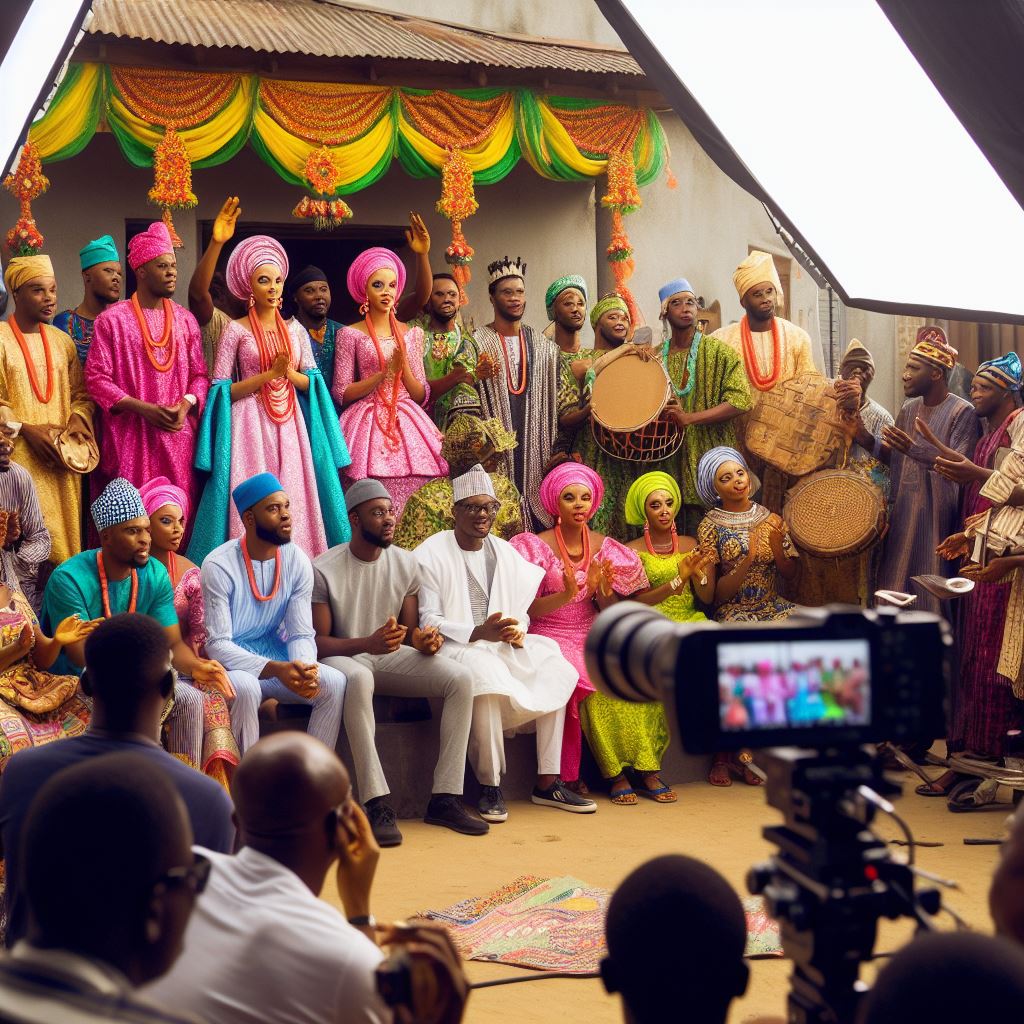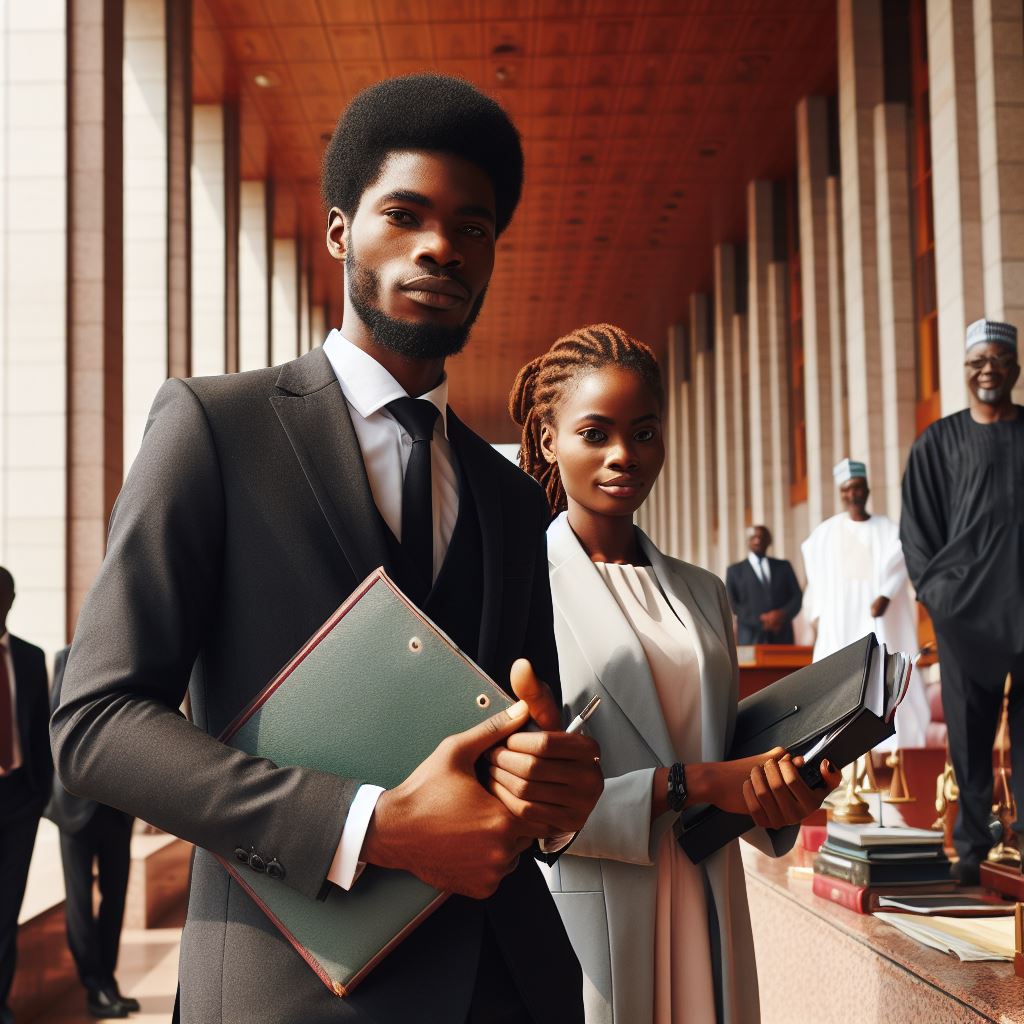Introduction
In the Nigerian film industry, having the right equipment is crucial. Filmmakers need high-quality tools to create compelling stories. The right gear elevates production value and enhances the visual appeal of films.
This section explores essential equipment every Nigerian filmmaker should have.
Cameras
A good camera is the cornerstone of filmmaking. Nigerian filmmakers need versatile and high-resolution cameras. DSLR and mirrorless cameras are popular for their flexibility and image quality.
The Canon EOS series and Sony Alpha cameras are top choices. These cameras offer excellent video capabilities and interchangeable lenses.
Lenses
Lenses are critical for capturing different scenes and emotions. Prime lenses provide sharp images and beautiful depth of field. Zoom lenses offer flexibility in framing shots.
Nigerian filmmakers should invest in a variety of lenses. A 50mm prime lens is great for portraits and close-ups. A 24-70mm zoom lens covers a wide range of shooting scenarios.
Lighting Equipment
Lighting can make or break a film’s visual quality. Proper lighting sets the mood and highlights important details. LED lights are versatile and energy-efficient.
Softboxes and reflectors help diffuse light and reduce harsh shadows. Nigerian filmmakers should have a basic three-point lighting kit. This kit includes a key light, fill light, and backlight.
Sound Equipment
Good audio quality is just as important as visual quality. Poor sound can ruin an otherwise great film. Nigerian filmmakers need reliable microphones and audio recorders.
Shotgun microphones are excellent for capturing dialogue. Lavalier microphones are perfect for discreetly recording actors. An external audio recorder, like the Zoom H4n, ensures high-quality sound.
Stabilizers and Tripods
Stability is crucial for smooth, professional-looking footage. Handheld shots can be shaky and distracting. Nigerian filmmakers should use stabilizers like gimbals and tripods.
Gimbals provide fluid movement and stability for dynamic shots. Tripods are essential for static shots and interviews.
Editing Software
Post-production is where the magic happens. Nigerian filmmakers need powerful editing software to bring their vision to life. Adobe Premiere Pro and Final Cut Pro are industry standards.
These programs offer extensive tools for editing, color correction, and sound design. They help filmmakers polish their projects to perfection.
Storage Solutions
Filmmakers generate a lot of data. Reliable storage solutions are necessary to keep footage safe. External hard drives and cloud storage services are popular options.
Nigerian filmmakers should have multiple backups of their footage. This ensures nothing is lost due to hardware failures or accidents.
Basically, Having the right equipment is essential for Nigerian filmmakers. High-quality gear enhances the storytelling process and ensures professional results.
Investing in cameras, lenses, lighting, sound equipment, stabilizers, editing software, and storage solutions is crucial. With the right tools, Nigerian filmmakers can create outstanding films that captivate audiences.
Cameras
Cameras: Choosing the Right Tool for the Job
Choosing the right camera is crucial for any filmmaker. In Nigeria, this decision can shape your film’s quality and impact. There are various types of cameras suitable for filmmaking, each catering to different needs and budgets.
DSLR Cameras
DSLR cameras are versatile and affordable. They are a popular choice among Nigerian filmmakers. These cameras offer excellent image quality and interchangeable lenses.
They are also lightweight, making them easy to handle during shoots. Canon and Nikon are well-known brands that provide reliable DSLR options. A DSLR is a great starting point for budding filmmakers on a tight budget.
Mirrorless Cameras
Mirrorless cameras are compact and offer high-quality video capabilities. They have faster autofocus and better image stabilization compared to DSLRs.
Sony and Panasonic are leading brands in this category. Mirrorless cameras are ideal for filmmakers who need mobility and excellent video quality. They can be more expensive than DSLRs but are worth the investment for serious filmmakers.
Cinema Cameras
Cinema cameras are designed specifically for filmmaking. They deliver the highest quality video and are used in professional productions.
Blackmagic and RED are popular cinema camera brands. These cameras offer advanced features like high dynamic range and raw recording. Cinema cameras are suitable for filmmakers with larger budgets and more ambitious projects.
Action Cameras
Action cameras like GoPro are perfect for capturing dynamic and extreme shots. They are small, durable, and can be mounted almost anywhere.
These cameras are ideal for documentaries and adventure films. Action cameras are affordable and provide unique perspectives that traditional cameras cannot achieve.
Smartphone Cameras
Smartphones have become powerful filmmaking tools. They are accessible and always on hand. Modern smartphones offer 4K video recording and advanced features like slow-motion and time-lapse.
Filmmakers can use smartphones for low-budget projects or as secondary cameras. Brands like Apple and Samsung lead the market with top-tier camera phones.
Importance of Choosing the Right Camera
Selecting the right camera depends on your film’s requirements and budget. A clear understanding of your project’s needs is essential.
If you are shooting a high-budget film, investing in a cinema camera is wise. For independent filmmakers or those starting out, a DSLR or mirrorless camera may be more practical.
Budget Considerations
Budget is a critical factor in camera selection. Higher-end cameras offer better quality but come at a cost. It’s important to balance your budget with your film’s needs.
Investing in a good camera can enhance your film’s production value. However, it’s possible to achieve great results with more affordable options if you know their capabilities.
In summary, Choosing the right camera is a crucial decision for Nigerian filmmakers. Understanding the types of cameras available and their features can help you make an informed choice.
Consider your film’s requirements and budget to select the best tool for your creative vision. With the right camera, you can bring your stories to life with high-quality visuals.
Read: Student Experiences: Life in Communication Arts
Lenses
Importance of Lenses in Filmmaking
Lenses are crucial tools for filmmakers. They shape the visual narrative of a film. The right lens can transform a simple shot into a stunning visual experience.
Different lenses capture various shot types and create unique visual effects. Understanding lenses helps filmmakers enhance storytelling through visual aesthetics.
Capturing Different Shots
Lenses determine the look and feel of each shot. Wide-angle lenses are perfect for capturing expansive scenes. They provide a broad view, making them ideal for establishing shots.
Telephoto lenses, on the other hand, are great for close-ups. They create an intimate feel, focusing on details and expressions.
Creating Visual Effects
Lenses also play a key role in creating visual effects. A prime lens offers sharp, high-quality images, enhancing the overall look. Zoom lenses allow for versatile shooting, making them practical for dynamic scenes.
Special effect lenses, like fisheye or macro, add unique perspectives, enriching the visual narrative.
Recommendations for Essential Lenses
For Nigerian filmmakers, having a versatile lens kit is essential. Here are some recommended lenses:
Standard Prime Lens (50mm)
A 50mm prime lens is a must-have for any filmmaker. It closely mimics human vision, providing natural-looking shots. Its wide aperture is great for low-light conditions and creating a shallow depth of field.
Wide-Angle Lens (16-35mm)
A wide-angle lens is perfect for capturing landscapes and large scenes. It adds depth and perspective to shots, making them more engaging. This lens is invaluable for establishing shots and dramatic scenes.
Telephoto Lens (70-200mm)
A telephoto lens is essential for close-ups and portrait shots. It compresses the background, bringing the subject into sharp focus. This lens is ideal for capturing emotions and intricate details, adding depth to character-driven scenes.
Zoom Lens (24-70mm)
A zoom lens offers versatility and convenience. It covers a wide range of focal lengths, reducing the need for multiple lenses. This makes it perfect for run-and-gun filmmaking, where quick adjustments are necessary.
Macro Lens (100mm)
A macro lens is great for extreme close-ups. It captures tiny details with stunning clarity. This lens is perfect for highlighting intricate textures and small objects, adding a unique visual element to the film.
In a nutshell, lenses are indispensable tools for Nigerian filmmakers.
They shape the visual storytelling, capturing different shots and creating varied visual effects. Investing in essential lenses like the 50mm prime, 16-35mm wide-angle, 70-200mm telephoto, 24-70mm zoom, and 100mm macro will greatly enhance the quality and versatility of any film project.
With the right lenses, filmmakers can elevate their visual storytelling, creating compelling and visually stunning films.
Lighting equipment
The Significance of Proper Lighting in Filmmaking
Proper lighting is crucial in filmmaking. It sets the mood and enhances the visual storytelling. Without the right lighting, scenes can look flat and unprofessional.
Lighting helps to highlight important elements in the frame and directs the audience’s attention. It can convey time of day, weather conditions, and emotional tones.
In Nigeria, where diverse locations and conditions prevail, good lighting is essential. Filmmakers must adapt to varying natural light and create consistency in their scenes.
Proper lighting ensures clarity and adds depth, making the film more visually appealing.
Essential Lighting Equipment
LED Panels
LED panels are a must-have for Nigerian filmmakers. They are energy-efficient and provide consistent lighting. These panels are portable and versatile, making them ideal for different shooting environments.
With adjustable brightness and color temperature, LED panels allow filmmakers to achieve the desired lighting effect.
Reflectors
Reflectors are essential tools for manipulating natural light. They help bounce light into shadow areas, creating a balanced look. Reflectors come in various colors like silver, gold, and white.
Each color serves a different purpose, such as adding warmth or enhancing highlights.
In outdoor shoots, reflectors are invaluable. They are lightweight and easy to position, making them perfect for on-the-go filmmaking. Using reflectors, filmmakers can soften harsh sunlight and reduce unwanted shadows, ensuring a well-lit scene.
Diffusers
Diffusers are crucial for softening light sources. They spread the light evenly, reducing harsh shadows and glare. Diffusers are especially useful when filming close-ups or in small spaces.
They create a natural and flattering light, enhancing the subject’s appearance.
Diffusers can be attached to LED panels or used with natural light. In Nigeria’s intense sunlight, diffusers help in creating a softer, more controlled lighting environment.
This versatility makes them indispensable for both indoor and outdoor shoots.
In essence, Investing in proper lighting equipment is non-negotiable for Nigerian filmmakers. LED panels, reflectors, and diffusers are essential tools that can transform the quality of a film.
They provide the necessary control and flexibility to handle various lighting challenges.
By mastering the use of these tools, filmmakers can elevate their production values. Good lighting distinguishes amateur films from professional ones.
It ensures that every scene is visually compelling and emotionally resonant. For Nigerian filmmakers, prioritizing lighting equipment is a step towards creating world-class films.
Read: Communication Arts: Balancing Theory and Practice
Audio Equipment
Good sound quality is essential for any film. It can make or break the viewing experience. Nigerian filmmakers must prioritize audio equipment to ensure their films sound professional.
Here, we’ll explore the crucial audio tools you need: microphones, recorders, and headphones.
Transform Your Career with Expert Guidance
Get personalized mentorship consulting that’s tailored to your unique path. Our expert advice is actionable and exclusive.
Get StartedImportance of Good Sound Quality
Sound quality profoundly impacts a film’s overall quality. Clear audio helps convey emotions and dialogue effectively. Viewers are more likely to engage with a film that has excellent sound.
Poor sound quality, on the other hand, distracts and detracts from the visual experience.
Investing in high-quality audio equipment is non-negotiable for serious filmmakers. Good sound elevates the production value of any film. It distinguishes amateur films from professional ones.
For Nigerian filmmakers aiming for global recognition, sound quality should never be compromised.
Essential Microphones for Filmmaking
Microphones are the cornerstone of good audio recording. Different scenes require different types of microphones. Shotgun microphones are ideal for capturing dialogue in outdoor or noisy environments.
They focus on sound from a specific direction, minimizing background noise.
Lavalier microphones, or lapel mics, are perfect for interviews and close-up scenes.
They clip onto the actor’s clothing, ensuring clear and consistent audio capture. Wireless lavalier mics offer flexibility, allowing actors to move freely.
Handheld microphones are useful for documentaries or live events. They provide clear audio and are easy to manage. Investing in quality microphones ensures your film’s dialogue and sound effects are captured accurately.
Reliable Audio Recorders
Audio recorders are essential for capturing high-quality sound. They are more reliable than camera audio inputs. Portable audio recorders like the Zoom H4n Pro are popular among filmmakers. They offer multiple input options and high-quality preamps.
Field recorders are also crucial for recording ambient sounds and effects.
They help create a rich soundscape for your film. Recorders with XLR inputs are preferable, as they provide better sound quality and compatibility with professional microphones.
Synchronizing audio from recorders with video footage is crucial. It ensures that dialogue and sound effects match perfectly with the visuals. A good audio recorder is a worthy investment for any filmmaker.
High-Quality Headphones
Headphones are vital for monitoring audio during filming and editing. They help detect any unwanted noise or audio issues immediately.
Over-ear headphones like the Sony MDR-7506 are a popular choice among professionals. They provide excellent sound isolation and accuracy.
In-ear monitors are useful for discreet monitoring during shoots. They are compact and portable. However, over-ear headphones are generally more reliable for critical listening. They ensure you hear every detail in your audio tracks.
Using high-quality headphones during editing is essential. They help achieve a balanced and professional sound mix. Consistent monitoring with good headphones ensures your final audio output is flawless.
In fact, For Nigerian filmmakers, investing in top-notch audio equipment is crucial. Good sound quality enhances the overall impact of a film. Microphones, recorders, and headphones are essential tools in your filmmaking arsenal.
Prioritize these items to ensure your films sound as good as they look.
Read: Famous Nigerian Alumni of Communication Arts Programs

Tripods and Stabilizers
The Necessity of Tripods and Stabilizers for Steady Shots
Tripods and stabilizers are essential for achieving steady shots in filmmaking. Without them, even the steadiest hand can produce shaky footage, which detracts from the professional quality of a film.
They allow filmmakers to maintain a consistent frame and capture smooth, stable shots, enhancing the overall visual appeal of their work.
In Nigerian filmmaking, where resources can sometimes be limited, investing in good tripods and stabilizers can significantly improve production quality.
These tools are particularly crucial during scenes that require precise camera movements or long-duration shots.
By using tripods and stabilizers, filmmakers can avoid the jitteriness that often plagues handheld shooting, ensuring a polished final product.
Options for Affordable and Effective Tripods
Affordable and effective tripods are available for Nigerian filmmakers. One popular option is the Manfrotto Compact Action Tripod, known for its lightweight design and ease of use.
It provides stability without breaking the bank, making it ideal for filmmakers on a budget.
Another excellent choice is the AmazonBasics 60-Inch Lightweight Tripod, which offers great stability and versatility at a low cost.
It features adjustable legs and a quick-release plate, making it a convenient option for various shooting scenarios.
For those needing a bit more robustness, the Neewer Carbon Fiber 66-Inch Tripod is a solid choice. It offers excellent stability and can support heavier cameras, making it a versatile tool for more demanding shoots.
Affordable and Effective Stabilizers for Nigerian Filmmakers
Stabilizers are also crucial for capturing smooth motion shots. The Zhiyun Smooth 4 is a highly recommended gimbal stabilizer for smartphone filmmaking.
It offers a range of advanced features, including a focus pull and zoom capability, ensuring smooth and cinematic shots.
For DSLR and mirrorless camera users, the FeiyuTech AK2000 provides excellent stabilization. It’s an affordable option that offers professional-grade features, including a touchscreen for easy control and a high payload capacity.
Another great option is the DJI Ronin-SC, a lightweight and compact stabilizer perfect for on-the-go filmmakers.
It provides exceptional stability and comes with a suite of intelligent shooting modes, enhancing creativity and efficiency on set.
In review, Tripods and stabilizers are indispensable tools for Nigerian filmmakers aiming to elevate their production quality.
These devices ensure that every shot is stable, smooth, and professional-looking, which is crucial in creating a visually appealing film.
By investing in affordable and effective options like the Manfrotto Compact Action Tripod, AmazonBasics 60-Inch Lightweight Tripod, and stabilizers like the Zhiyun Smooth 4 and FeiyuTech AK2000, Nigerian filmmakers can achieve remarkable results without straining their budgets.
With the right equipment, filmmakers can focus on their creative vision, knowing that their gear will support them in capturing it flawlessly.
Read: Digital Media Trends in Communication Arts
Editing software
When it comes to filmmaking, editing plays a crucial role in bringing the story to life. Post-production editing allows filmmakers to refine their footage, add special effects, and create a cohesive final product.
In Nigeria, as in any other part of the world, having the right editing software is essential for creating high-quality films.
Importance of Post-Production Editing
Post-production editing is where the magic happens in filmmaking. It allows filmmakers to stitch together different shots, adjust the pacing, and enhance the overall visual appeal of the film.
Editing software gives filmmakers the tools they need to fine-tune their work and bring their creative vision to fruition.
Editing also plays a crucial role in storytelling. Through the process of editing, filmmakers can manipulate the audience’s emotions, create tension, build suspense, and ultimately deliver a compelling narrative.
Good editing can elevate a film from good to great, making it imperative for Nigerian filmmakers to invest in quality editing software.
Popular Editing Software
There are several editing software options available to Nigerian filmmakers, with some of the most popular choices being Adobe Premiere Pro and Final Cut Pro. Here’s a closer look at these two industry-standard editing programs:
Adobe Premiere Pro
- Adobe Premiere Pro is a versatile and powerful editing software used by professionals across the globe.
- It offers a wide range of tools for editing, color correction, audio mixing, and visual effects.
- With its intuitive interface and seamless integration with other Adobe Creative Cloud programs, Premiere Pro is an excellent choice for filmmakers looking to streamline their workflow.
- It also supports a variety of video formats, making it suitable for projects of all sizes and scopes.
- Whether you’re working on a short film, a documentary, or a feature-length movie, Adobe Premiere Pro has the tools you need to bring your vision to life.
Final Cut Pro
- Final Cut Pro is another popular choice among filmmakers, particularly those working on Mac computers.
- Known for its user-friendly interface and powerful editing features, Final Cut Pro is a favorite among many professionals in the industry.
- It offers advanced tools for editing, color grading, and audio processing, allowing filmmakers to achieve a polished look for their projects.
- Final Cut Pro also supports high-resolution video formats, making it ideal for projects that require the highest level of visual quality.
- With its seamless integration with other Apple products and services, Final Cut Pro is a convenient choice for filmmakers working within the Apple ecosystem.
Ultimately, the choice between Adobe Premiere Pro and Final Cut Pro comes down to personal preference and workflow. Both programs offer robust features and tools that can help Nigerian filmmakers create professional-quality films.
Whichever software you choose, investing in a high-quality editing program is essential for bringing your creative vision to life on the big screen.
Read: Impact of Communication Arts on Nigerian Media
Storage devices
When it comes to filmmaking, having the right equipment is essential to creating high-quality films that captivate audiences. Nigerian filmmakers, in particular, need to be well-equipped with the necessary tools to bring their creative visions to life.
In this section, we will discuss the must-have storage devices for Nigerian filmmakers.
Why Storage Devices are Essential
One of the most crucial aspects of filmmaking is storing and managing your footage and edited files. Without sufficient storage, you risk losing your hard work and creativity.
It is important to have a reliable storage solution to ensure that your work is safe and easily accessible.
Options for Storage
There are several options available for filmmakers to store their work securely. External hard drives are a popular choice for storing raw footage and edited files.
These devices provide ample storage space and can be easily transported from one location to another.
Cloud Storage for Filmmakers
In addition to external hard drives, cloud storage options are becoming increasingly popular among filmmakers. Cloud storage allows you to store your work online, making it accessible from anywhere with an internet connection.
This is particularly useful for collaborations with team members who may be in different locations.
Advantages of External Hard Drives
- Ample storage space for raw footage and edited files
- Portability for easy transportation
- Secure storage of work offline
- Reliable backup solution to prevent data loss
Advantages of Cloud Storage
- Accessibility from anywhere with an internet connection
- Easy collaboration with team members in different locations
- Automatic backup and sync of files
- Scalable storage options to accommodate growing needs
Recommendations for Nigerian Filmmakers
For Nigerian filmmakers, it is important to have a combination of external hard drives and cloud storage options to ensure that your work is safe and easily accessible.
Investing in reliable storage devices will not only protect your work but also streamline your workflow and collaboration with team members.
Remember, having sufficient storage is essential for the success of your filmmaking projects. Make sure to choose storage devices that meet your specific needs and budget.
With the right storage solutions in place, you can focus on bringing your creative visions to life and sharing your stories with the world.
Accessories
When it comes to filmmaking in Nigeria, having the right accessories is crucial for a smooth production process. Here are some essential accessories that every Nigerian filmmaker should have:
Camera Bags
A sturdy camera bag is essential for transporting your camera and other equipment safely. Look for a bag that is padded and has compartments to keep everything organized.
Memory Cards
Having enough memory cards is vital to ensure that you never run out of storage space while shooting. Invest in high-quality cards with sufficient capacity for your needs.
Cleaning Kits
Proper maintenance of your filmmaking equipment is essential for longevity and optimal performance. A cleaning kit with tools like lens wipes and air blowers can help you keep your gear in top condition.
Tips for Proper Care and Maintenance of Filmmaking Equipment
Store Your Equipment Properly
When not in use, make sure to store your equipment in a clean, dry, and secure place. Avoid leaving your gear exposed to dust, moisture, or extreme temperatures.
Regularly Clean Your Gear
Dust, dirt, and debris can accumulate on your equipment, affecting its performance. Use gentle cleaning tools and solutions to regularly clean your cameras, lenses, and other gear.
Check and Replace Batteries
Make it a habit to regularly check the battery levels of your equipment and replace them as needed. Always carry spare batteries with you to avoid running out of power during shoots.
Handle Your Equipment with Care
Avoid mishandling or dropping your equipment, as this can lead to damage. Always use protective cases or bags when transporting gear and handle everything with care.
Schedule Maintenance Checks
Consider scheduling regular maintenance checks for your equipment to ensure that everything is in proper working condition. This can help prevent unexpected issues during shoots.
By following these tips and investing in essential accessories, Nigerian filmmakers can ensure that their equipment stays in top condition and their productions run smoothly.
Conclusion
The Importance of the Right Equipment
Having the right equipment is crucial for Nigerian filmmakers. It significantly enhances the quality of film production. Quality equipment ensures better visuals, sound, and overall production value.
Nigerian filmmakers face unique challenges that quality equipment can help overcome. With the right tools, storytelling becomes more immersive and engaging.
Quality equipment minimizes technical issues, allowing filmmakers to focus on creativity. The audience notices the difference in production quality immediately. This can lead to increased viewership and critical acclaim.
Enhancing Creativity and Efficiency
Investing in quality equipment boosts both creativity and efficiency. When filmmakers have reliable tools, they can explore new techniques and styles.
This fosters innovation and originality in Nigerian cinema. High-quality cameras and sound equipment capture the director’s vision more accurately.
This precision translates to a more compelling final product. Efficient equipment also speeds up the filming process, saving valuable time and resources.
Filmmakers can shoot more takes and experiment with different angles without technical constraints. This flexibility is essential in a fast-paced production environment.
Meeting Industry Standards
The Nigerian film industry is growing rapidly and becoming more competitive. To stand out, filmmakers must meet and exceed industry standards. Quality equipment plays a significant role in achieving this.
It ensures that films meet international quality benchmarks. This is vital for films aiming for global distribution and recognition. By using the best tools, Nigerian filmmakers can compete on a global stage.
This enhances the reputation of Nollywood and attracts international collaborations. Such collaborations can bring more resources and expertise into the industry.
Encouraging Investment in Quality Equipment
Nigerian filmmakers should prioritize investing in quality equipment. Though it may seem costly initially, the long-term benefits outweigh the expense.
Quality equipment is a worthwhile investment that pays off in multiple ways. It reduces the need for constant repairs and replacements, saving money over time.
Filmmakers can produce higher-quality films, attracting bigger audiences and more revenue. Investors and sponsors are more likely to support projects with high production values.
This can lead to more funding and better opportunities for filmmakers.
The Future of Nigerian Filmmaking
The future of Nigerian filmmaking looks bright with the right equipment. Quality tools empower filmmakers to tell their stories more effectively. They allow for higher production values, leading to more professional-looking films.
This can elevate Nollywood’s status globally and attract more international attention. Nigerian filmmakers have the talent and creativity to make world-class films.
With the right equipment, they can achieve their full potential and revolutionize the industry.
Final Thoughts
In closing, having the right equipment is essential for Nigerian filmmakers. It enhances production quality, boosts creativity, and meets industry standards.
Investing in quality equipment is a wise decision that brings long-term benefits. Nigerian filmmakers should embrace this investment to elevate their craft. The right tools can transform Nollywood and secure its place on the global stage.




